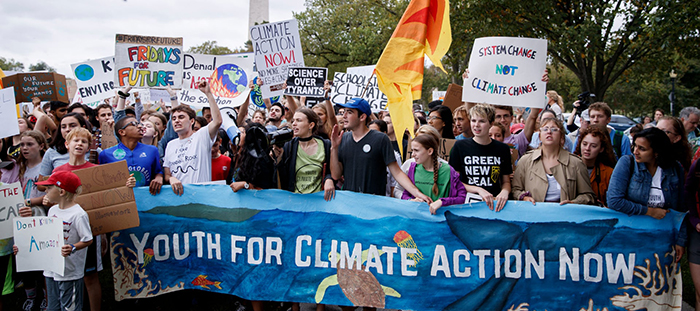by Suwei Wang & Abby Lewis
Between September 20th and 27th, 2019, at least 4 million people from over 150 countries stepped up to support young climate strikers and demand an end to the age of fossil fuels. Greta Thunberg, a 16 year old Swedish environment activist, hit the headlines again.
Thunberg began striking for action on climate change last year leading up to the Swedish parliamentary election. Her solitary strike from school has since transformed into an international movement of students that leave school each Friday to fight for climate action. The Global Climate Strike from September 20th to 27th was the first event that specifically invited all generations to participate, and it brought the movement to the forefront of national and international news.
In the midst of all of this, our first year Interfaces of Global Change (IGC) seminar met to discuss politicization of science and the end of expertise.
What does it mean that the world’s most prominent climate activist is a 16-year-old child? What authority does she have? How does her work politicize science? What is the role of scientists in these public demonstrations?
We drew from the week’s events to begin diving into the subject of politicization of science because the climate strikes were impossible to ignore, and because they helped to shed light on some of the complex and highly relevant issues surrounding the intersection between science and policy.
More broadly, our discussion focused on ideas of expertise and science politicization. Various studies and surveys have shown that there has been an alarming increase in the distrust of scientists and experts in Americans. In the seminar, we broke into small groups to discuss what makes a person an expert in a field and why the authority of experts has been undermined over time. We also discussed the politicization of science. While there is a consensus of scientists that climate change is real and human activities are causing it, the way this knowledge is disseminated to citizens by various powers, including politicians, can be selective or biased, creating a political distortion of the scientific facts. This is perpetuated by people’s desire to hear identity-confirming news from media outlets and politicians.
At the end of the discussion we came back to Greta Thunberg and the Global Climate Strike.
According to an anonymous survey, the majority of students in the class (65%) went or would have gone to the strike if they were able to. In reality, three-fourths of the students did not go.
We discussed some of the reasons students of global change would decide to participate or not participate. Some students argued that taking a visible political stance in this way may undermine their ability to talk about climate policy with others who disagree with their views. Some argued that their time is better spent doing research that could potentially contribute to the fight for environmental protection in the future. However, other students disagreed, arguing that this type of action is an important extension of the theoretical discussions we have our seminar, and scientists should use their authority as experts to support a movement that is advocating for evidence-based policy.
Ultimately, there probably cannot be a proscriptive answer to this question that works for every scientist, and having a diversity of approaches from different individuals is often helpful. However, it is often useful to revisit these issues on an individual level in order to ensure your actions are in agreement with your beliefs.
Suwei Wang is a third year PhD student from Translational Biology, Medicine, and Health Program, working in Dr. Julia Gohlke’s lab in Environmental Health.
Abby Lewis is a first year PhD student in the Biological Sciences department. She works in Dr. Cayelan Carey’s lab studying freshwater ecology and biogeochemistry.




